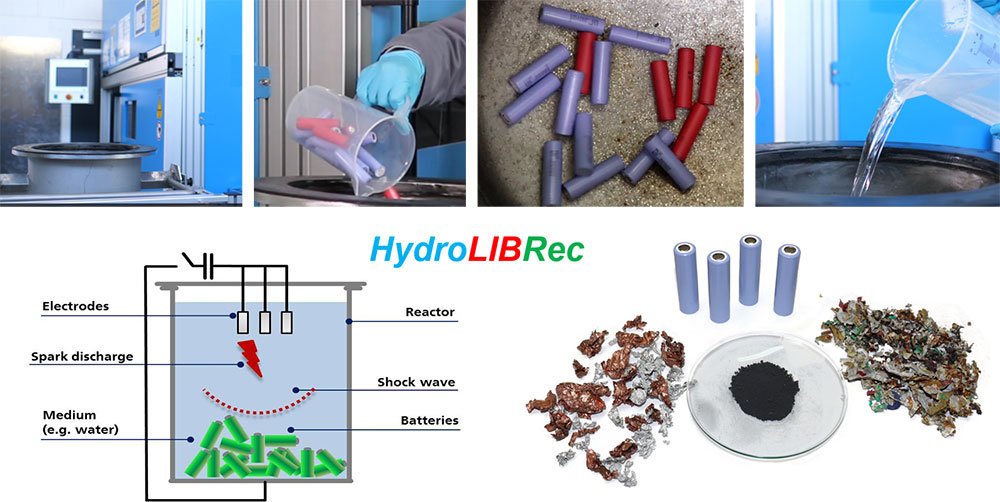HydroLIBRec – Optimized process chains for hydromechanical Li-ion battery recycling
The aim of this research project is to create the technological prerequisites for an effective, economically viable, environmentally friendly and function-preserving battery recycling (complete and optimized process chain) that guarantees the availability of lithium battery resources throughout Germany and Europe. The closure of the material cycles is ensured after the function-preserving recovery of the active materials through subsequent chemical processing and the production of “recycling battery cells”. The alternative process chains as well as the variations to be compared are modeled and evaluated by means of a life cycle assessment and economic efficiency analysis. This also includes a comparison with established processes and is intended to show which options for efficient recycling for battery materials are practically available in Germany.
The identification of possible process chains for Li-ion battery recycling taking into account established industrial processes and new process technology as an important intermediate step. Different sub-rocesses for pretreatment for the shock wave process are to be developed and optimized by varying the sequence of the process steps and the process parameters. The shock wave process should also be evaluated by comparing it with other shredding methods. The subsequent sorting of the battery fragments to separate metals, plastics and black matter also takes place in the water bath. In this project, these core process steps are mapped in a digital simulation model so that (re)designs of the battery cell can be derived quickly. A resource-saving process for direct recycling, i.e. for the cyclical re-use of active materials, includes a mechanical separation of the cathode material (active materials, carbon black and binder) with appropriate processing, i.e. chemical regeneration or enrichment of elements such as Li, Co, Mn or Ni in the active material crystal structures. After the electrode layers have been detached and pretreated (e.g. ultrasound process, dispersion, wet grinding), the agglomerate-free cathode material is fed to a decanter centrifuge as an aqueous suspension and fractionated without the use of further chemicals. The fractionation of the cathode material is always optimally and flexibly managed in response to fluctuations in the composition and concentration of the material inflow, among other things, by operating the system. This recycling approach enables the direct reuse of the recovered and possibly regenerated active materials in recycled batteries, which is very advantageous from an economic and ecological point of view.
The project combines recycling and design at the construction and material level with the aim of recycling almost all of the materials in a battery and, in particular, of reusing the resource-critical electrode materials in new batteries. From the dismantling of the battery pack to the qualification of active materials, the entire process chain is to be developed and optimized. Using sample batteries, conclusions are drawn about the recyclability, which lead to a modification of the design in terms of recyclability. The concept for simulation-based, recycling-optimized design provides a universal tool that can also be used on other batteries of any type and size and thus enables efficient use and cycle of resources in a wide range of applications.
It is a unique selling point of this project that design concepts are derived directly from simulation results for the battery architecture and the associated process technology. With the digital models it is possible to specifically analyze and optimize the (re)design and the product properties as well as process parameters. The aim is to optimize the process parameters and process chains in order to qualify the properties of the black-matter recyclate for use in a recyclate battery (proof-of-concept).
© HydroLIBRec
Contact
Fraunhofer Research Institution for Materials Recycling and Resource Strategies IWKS
PD Dr. habil. Benjamin Balke
Aschaffenburger Straße 121, 63457 Hanau
Duration of project
01.01.2021 – 31.12.2023
Involved partners
